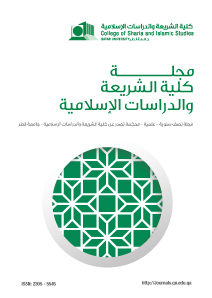نحو توظيف معايير الفاعلية في تطوير مقرر الثقافة الإسلامية بجامعة قطر
الملخص
رغم أن هناك محاولات لتطوير مقرر الثقافة الإسلامية في عدد من الجامعات، إلا أن هذه المحاولات لا يبدو أنها حققت التطوير المنشود بالنظر إلى التحديات التي ينبغي أن يتعاطى معها المقرر والأهداف الأصلية التي ينبغي أن يحققها. فما السر في ذلك؟ على غرار المقولة المشهورة لرابعة العدوية "استغفارنا يحتاج إلى استغفار" نقول إن "تطويرنا يحتاج إلى تطوير"، ذلك أنه يفتقر إلى روح التطوير وجوهره ألا وهو الفاعلية. فما معايير التطوير الفعّال؟ هذه الورقة ترمي إلى تسليط الضوء على معايير التطوير الفعّال، وبلورة موجهات هادية ومقترحات عملية لتطوير مقرر الثقافة الإسلامية بجامعة قطر تطويراً فعّالاً شكلاً ومضموناً ونهجاً تدريسياً في ضوء تلك المعايير. والورقة تقدم نفسها بالأساس على أنها "ورقة عمل توجيهية" لأي مشروع تطويري للمقرر يرمي إلى الفاعلية.
المقاييس
##plugins.themes.bootstrap3.article.details##
الثقافة الإسلاميةالمناهج--تطويرجامعة قطر
بحوث في الثقافة الإسلامية، أ.د. حسن عيسى عبد الظاهر وآخرون (القاهرة: دار الحكمة، 1993م).
الثقافة الإسلامية تخصصاً ومادة وقسماً علمياً، عبد الله بن إبراهيم الطريقي وآخرون (دراسة تنظيرية وتعريفية موجزة أعدها مجموعة من المختصين في الثقافة الإسلامية بكلية الشريعة بالرياض، 1417هـ).
الثقافة الإسلامية في الجامعات، أ.د. عدنان زرزور (بيروت: المكتب الإسلامي، 1990م).
الثقافة الإسلامية في الجامعات العربية، شافي بن سفر الهاجري (رسالة دكتوراه غير منشورة مقدمة إلى جامعة أم درمان الإسلامية، 1999م).
الثقافة الإسلامية وحاجة الطالب الجامعي إليها: رؤية مستقبلية لمقررات الثقافة الإسلامية في جامعة طيبة، سلطان بن علي محمد شاهين، (مجلة جامعة طيبة للآداب والعلوم الإنسانية، السنة الثانية، العدد 4، 1435هـ.
الثقافة الإسلامية والتحديات المعاصرة، أ.د. حسن عيسى عبد الظاهر وآخرون (الدوحة: مطابع الدوحة الحديثة، 2000م
Designing Effective and Innovative Courses (NAGT, 2010: http://serc.carleton.edu/NAGTWorkshops/coursedesign2010/index.html
Minds Maps for Business: Using the Ultimate Thinking Tool to Revolutionise, Tony Buzan with Chris Ghriffiths (Minds Maps for Business: Using the Ultimate Thinking Tool to Revolutionise How You Work, London: Pearson, 2014).
Coveyو Steven (2011), The 3r Alternative, New York: Free Press.
Creelman James & Sebastian Rubens y Rojo (2015). Executing Strategy: The Critical Role of Culture, Part I: Creating a Strategy-Aligned Culture, Palladium Group, Inc.
Eagleton, Terry (2000). The Idea of Culture, Oxford, UK: Blackwell Publishers Ltd.
The Quality School: Managing Students Without Coercion, William Glasser (New York: HarperCollins Publishers, Inc., 1998).
Norton, David P [Founder and Director] (2007) Strategy Execution: A Competency that Creates Competitive Advantage, Palladium Group, Inc (http://thepalladiumgroup.com).
Robinson, Ken Sir, (2015) How to build a Culture of Innovation, Tid Talk on youtube.
(https://www.youtube.com/watch?v=zABwof_oYrw)
عقائد وتيارات فكرية معاصرة، أ.د. محمد شامة وآخرون (الدوحة: دار قطري بن الفجاءة).
فاعلية التدريس: رؤية نقدية، وتجربة ذاتية، د. إسماعيل المصلح، (دراسة غير منشورة).
مشكلة الثقافة، مالك بن نبي، (دمشق: دار الفكر، 1985م).
من أجل تميز التربية القطرية: إعادة هندسة للتفكير الإداري المهيمن، د. إسماعيل المصلح (دراسة قدمت لمؤتمر "الجودة: الكفاءة والإتقان والتميز" الهيئة العامة للتعليم التطبيقي والتدريب، الكويت، 2002م).
ميليشيا الإلحاد، عبد الله بن صالح العجيري (لندن: تكوين، 2014م).


